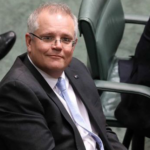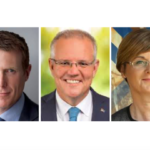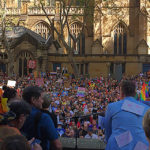Religious Zealotry Is Dangerous: The Rationalist Society’s Dr Meredith Doig on the PM’s Speech
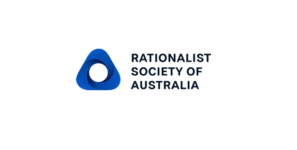
“Sure, social media has its virtues and it’s values, and it enables us to connect with people in ways we never have before,” said prime minister Scott Morrison. “Terrific, terrific, but those weapons can also be used by the Evil One, and we need to call it out.”
The PM made these remarks as he addressed the Australian Christian Churches (ACC) conference in an unofficial capacity on the Gold Coast last month. And the subsequent release of the footage of the speech raised more than a few eyebrows due to some of his more contentious statements.
On the social media issue, the Pentecostal PM further warned that he thinks “it is an evil thing… a very evil thing”. He advised the congregation that they have to pray about it and raise up their “spiritual weapons against” it, as it has the potential to take young people’s hope and courage.
Other aspects of Morrison’s speech that raised consternation were his admitting to secretly laying his hands on distressed citizen’s in order to heal them, as well as his being “chosen” by the Lord “for a season” to do his work in the role of the head of state.
Divine Right
The Australian Christian Churches is an association of this nation’s Pentecostal churches and it’s linked to the international World Assemblies of God Fellowship. The PM’s church of choice, Sutherland’s Horizon Church, is affiliated with the ACC.
Although only 1.1 percent of the Australian population identified as being Pentecostal in the 2016 census, it’s the fastest growing religious faith on Earth. And, as evidenced by Morrison, adherents of the evangelical religion have positioned themselves in some prominent places in this country.
Over in the US, Pentecostalism and other evangelical Christian faiths have been on a dramatic rise over recent decades. And former US president Donald Trump tapped into their concerns, which saw them form a significant part of his supporter base, known locally as the Christian Right.
A general concern raised by critics about evangelical churches is that they believe in prosperity theology, which holds that faithful followers of God are rewarded with material wealth in this life, while poverty is seen as a sign of immorality.
Reason and evidence
Established in 1906, the Rationalist Society of Australia (RSA) is the nation’s oldest free thought group. It advocates for reason and evidence being the basis of policymaking.
So, while the RSA does promote freedom of religion, it also asserts that no particular faith should be guiding government.
The recent footage of Morrison addressing the ACC congregation was released by the Rationalist Society on YouTube just days following its broadcast by the Vineyard Christian Church, as it believes it was in the public interest to do so.
Sydney Criminal Lawyers spoke to RSA president Dr Meredith Doig about her reaction to what the prime minister said on the Gold Coast, the concerns the RSA has about the Coalition’s Religious Discrimination Bill, and she also outlines what the Seven Mountains mandate is.
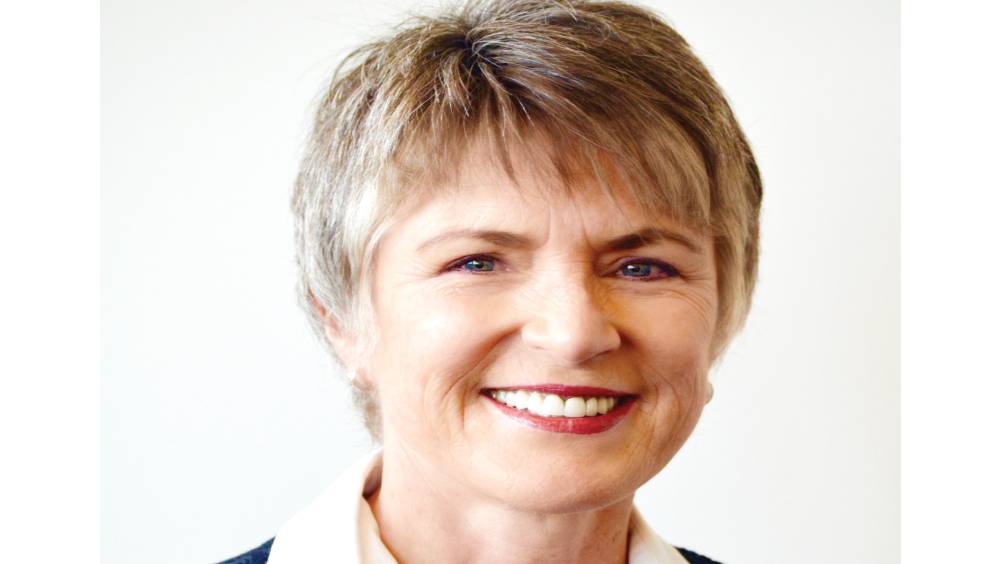
In a recent article in the Big Smoke, you set out that your organisation released the footage of the PM’S speech as it was in the public interest to see what Morrison had to say in this regard.
Dr Doig, can you elaborate on why this is the case?
The number of articles written following our release of the video provides evidence enough of the public’s interest in what the PM had to say at this conference.
Before sharing this video, we did consider the legal and social implications. That is, whether it might be considered an invasion of privacy, or subject to some form of copyright.
But the person giving the speech was the PM and the speech was recorded, not by us but by someone in the audience.
That person later showed it to another audience during which it was re-recorded and shared on social media.
If it had been a speech by a private individual at a closed meeting, there might have been an argument of privacy. But this was the nation’s prime minister, and the conference was open.
So, we considered it in the public domain and in the public interest.
Despite some media commentators assuming the RSA is against religion per se, we do not say that religion has no place in the public square of ideas.
We support freedom of religion and belief. But unlike in America, Australians have been wary of politicians who wear their religion on their sleeves. We tend to view religion as a private matter.
A PM who so publicly asserts the primacy of God over everything and everyone tends, I think, to make most Australians very uncomfortable.
There were a number of concerns raised about what Morrison said during the speech, specifically because he is the leader of our nation.
What was your reaction to the gist of the speech? Did you find areas for concern?
I must say that when I first listened to the speech, I found it rather unremarkable – in fact, familiar rather than shocking.
And reflecting on why this was so, I realised that it reminded me of when I was a child attending Sunday school in the 1950s and 1960s.
Sunday school in the 50s and 60s was repetitive and boring. As children we were supposed to learn catechisms off by heart, even if we didn’t understand them.
If we didn’t do our homework from week to week, we were castigated by the minister, made to feel small and sinful.
One time I remember thinking to myself, “I’ll show him” and I memorised the catechism and volunteered to recite it perfectly the next week. I was of course praised but to me, I had just showed them that their silly little game was easy to master if I chose to do so.
So, when I listened to Morrison’s speech again, I realised that its tone transported me back to that time when I was treated as a naughty child.
Despite all his bonhomie, the PM – and probably any other pastor preaching in this way – treated his audience in a parent-child way: “Come on! I need you to help me do this!”
It’s like, “Will you be daddy’s little helper?”
That paternalistic attitude, the sight and sound of a grown man treating other grown-ups like children, is frankly creepy. I prefer my prime ministers to treat people as adults.
In his 2008 maiden speech in federal parliament, our current PM went out of his way to make clear that in his understanding Australia is not a secular society. He said that while people are free to think it is, that continues to remain a belief.
What are your thoughts about the politician who is now head of state making such an assertion?
Well, in one sense he is just plain wrong. The RSA will soon be releasing a major piece of research that shows without doubt that the vast majority of Australians – 85 percent – are not actively religious.
It shows their support for social reforms, like equal marriage, legalisation of abortion and voluntary assisted dying: all issues opposed vociferously by devout clerical leaders.
The number of people choosing No Religion in the Australian census has been increasing – from 18 percent in 2006 to 30 percent in 2016 – and this trend is true also in the US and in the UK.
The census is not even a good indication of the number of people for whom religion is simply irrelevant because the way the religion question is worded in the census assumes the respondent has a religion.
Other reliable surveys indicate that the number of No Religionists in Australia is actually more like 40 percent, not 30 percent.
In another sense, he’s right. Despite our constitution promoting state neutrality when it comes to religion – section 116 – Australia has always had a simmering battle between religionists and secularists throughout our history.
And the religionists have won big battles – state aid to Catholic schools, for example, and the School Chaplaincy Program, which has now spent over a billion dollars of taxpayers’ money protecting jobs for the religious.
The Rationalist Society runs a number of campaigns around drug law reform, voluntary assisted dying and challenging the government’s pursuit of Christian chaplains over representatives of any other faith.
Another campaign involves the prime minister’s favoured Religious Discrimination Bill. Although the two drafts of this bill have been set aside during the pandemic, it is still on the agenda.
Why does the RSA oppose the Religious Discrimination Bill?
Actually, we don’t oppose the entirety of the Religious Discrimination Bill. Most states and territories already outlaw discrimination on the grounds of religion, and so does the federal Workplace Relations Act.
We support the principle of freedom of religion and belief, and non-discrimination on the grounds of religion or belief.
If the federal Religious Discrimination Bill just did this, we would probably support it. But it goes much further.
It would make it easier for religionists to impose their beliefs on others and to discriminate against others who don’t share those beliefs.
It would override all other state and federal anti-discrimination laws, as well as workplace health and safety laws.
It would put employers in an impossible situation if, for example, an employee starts proselytising at work and other staff object.
It would make it impossible for local councils to enforce by-laws to stop public haranguing by religious zealots, even if the locals complain.
The bill would privilege religious expression above any other expression of beliefs.
This bill would be incredibly divisive, just at a time when Australia needs to work together.
And in any case, the Ruddock Inquiry, which led to the bill, showed that there is no need for the bill because the vast majority of Australians accept that there is religious freedom in this country.
The bill was a knee-jerk reaction to some high-profile cases of religious zealotry, and it should be dropped altogether or rewritten to conform with other anti-discrimination laws.
Morrison is not alone in holding the prime ministership and being an adherent of the Christian faith. John Howard, Tony Abbott and Kevin Rudd are all Christians.
However, many have raised the point that Morrison has approached his faith whilst being head of state in a different way to others.
What are your thoughts on this matter?
Each of these prime ministers had their own idiosyncratic interpretations of their chosen religion.
Abbott’s Catholicism was perhaps the most public, showing up for example in his personal view as health minister to ban the importation of RU486, the “morning after” pill.
Howard presided over the overturning of the Northern Territory’s law permitting voluntary assisted dying and introduced federal funding of religious chaplains in secular government schools.
Australians are familiar with the Anglicanism of a Howard or the Catholicism of an Abbott and I suspect many warm to Kevin Rudd’s interpretation of Christianity as a mission of social action in favour of the poor and the oppressed.
But Morrison’s Pentecostalism is unfamiliar. There’s a jolt when someone speaks of “the Evil One” as if such a thing actually existed or admits to a secret “laying on of hands” when comforting unsuspecting disaster victims.
That’s because Morrison’s brand of religion isn’t the familiar English Protestantism or Irish Catholicism.
It’s one of those fringe religions that’s found fertile ground in America, filling its disciples with zealotry and passion, certain that their particular interpretation of the Bible was the only true one and that they have a mission from God to impose their interpretation on everyone else.
We don’t have to look far to observe that any such religious zealotry is a dangerous thing.
The RSA is not anti-religion, but we are stridently pro-secular.
What a person believes in the privacy of their own mind is up to them but when they try to impose their beliefs on others, particularly using the institutions of the state – the law, the public education system, the public health system – then that’s a step too far and it must be vigorously opposed.
Morrison is not alone in pushing a Christian agenda in parliament. It’s been reported that at the Church and State Summit in February, members of the Christian Right, which included MPs and advocates, discussed how to gain greater sway in Australian parliaments.
In the opinion of the RSA, should this be taken as a serious concern by the wider public?
That conference had an interesting logo. It was a stylised image of seven mountains, and it represents the “Seven Mountains mandate” followed by many Pentecostalists and other charismatic religions.
This mandate has its origins in “Dominionist” theology, the idea found in Genesis that Christians need to “take dominion” of the earth and its people.
The seven mountains represent seven institutions of society: education, religion, the family, business, government and the military, the arts and entertainment, and the media.
The idea is that modern day apostles and prophets must take the reins of leadership in these institutions and go out into the world using the tactics of spiritual warfare to crush evil before Jesus Christ’s final return.
This is why you see religionists infiltrating political parties. This is why you see religious lawyers gathering together to draft laws to increase religious privileges. This is why the numbers at parliamentary prayer breakfasts have expanded.
So yes, this is a serious matter. Dominionist theology is extreme, it is well-funded, and it is intent on global domination.
And lastly, Dr Doig, in your article, you further posit that in our secular nation, Australian parliaments continue to observe Christian prayers, whilst the makeup of parliament and the wider community is multifaith and multicultural.
What sort of broader reforms are needed within the Australian political and public sector systems that would protect against a PM of a particular religion being so emboldened as to put that faith’s beliefs on the political agenda?
Well, obviously we think there should be a genuine separation of church and state – or any religion and the state – and this should be protected by law.
I repeat: this does not mean no religion in the public square. But it does mean that religion should not be favoured by governments over any other worldview.
This means there should be some substantive changes in our legal and social systems:
The “advancement of religion” should be removed as a head of charity. Many religious organisations do good works, but these would be recognised as charitable under other heads, such as the relief of poverty or the advancement of education.
Why should we subsidise the advancement of belief in a supernatural being? Just how is that charitable?
Schools, hospitals and aged care homes that get taxpayer funds should be obliged to comply with the laws of the land, including anti-discrimination laws. There should be no special exemptions for religious institutions. If they don’t want to comply, they shouldn’t get public money.
Special Religious Instruction should be banned in all public schools. Teaching about religions and beliefs is one thing, but SRI is not teaching, it’s indoctrination and it has no place in a secular public education system.
The millions of dollars of public funds dedicated to the overtly discriminatory chaplaincy programs, in schools and hospitals and in our military and emergency services, should be redirected to non-discriminatory pastoral support services.
Children must not suffer because of the religious views of their parents. So medically unnecessary cutting of children’s genitals, whether female or male, should be unlawful.
And there should also be some symbolic changes:
The Christian-only prayers in our parliaments and local councils should be replaced by secular reflections and recitations from a range of faiths.
I think our leaders might learn a lot from hearing the reflections of Marcus Aurelius, for example, the Stoic Roman emperor, or perhaps they might like to adopt the RSA’s alternative.



